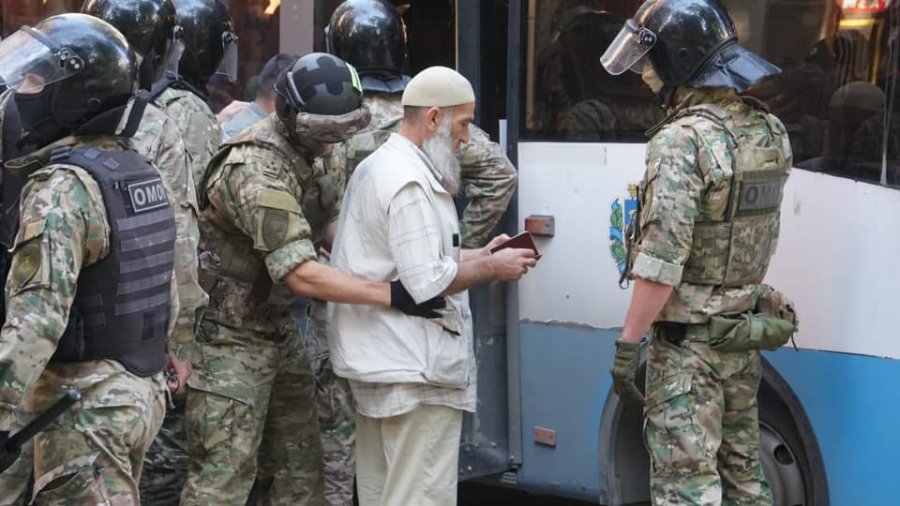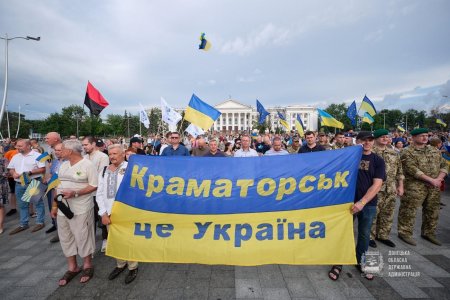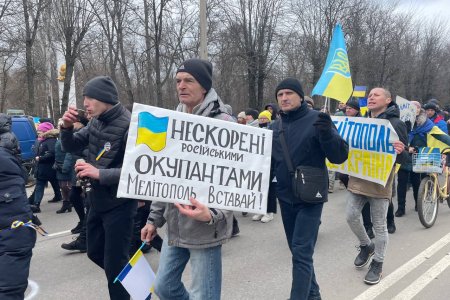
For the first time, Freedom House has rated all Russian-occupied parts of Ukraine together, and its findings could not be more damning. Where Ukraine stands at 51/100 and is ranked as Partly Free in the NGO’s Freedom in the World 2025 report, and even Russia gets 12/100 (‘Not Free’), the Ukrainian territory under Russian occupation is not merely ‘Not Free’, but has plummeted into negative figures (-1 / 100). This is worse even than the typically ‘worst of the worst’ like North Korea (3/100) and Turkmenistan (1/100).
The report would be worth showing to those political leaders who are insisting that Ukraine should accept Russia’s occupation of its territory. Doing so means betraying Ukrainian citizens and abandoning them to a frightening level of lawlessness and lack of freedom. It is especially important that Freedom House has seen the need to assess all occupied territory together because of the similarities in the conditions on all occupied territory. It has long been evident that Russia brings the same enforced disappearances; abductions and torture; fabricated trials and terror tactics to all parts of Ukraine which fall under its occupation.
Although bad from the outset, the situation did deteriorate radically after Russia’s full-scale invasion of Ukraine, and not only because so much more territory in the Donetsk; Luhansk; Kherson and Zaporizhzhia oblasts came under Russian occupation. In Freedom House’s 2021 report, occupied Crimea had a rating of 7/100, while Eastern Donbas (occupied parts of Donetsk and Luhansk oblasts) was assessed as 4/100. This was, admittedly, only because the level of civil rights was deemed a little higher. Political rights were as dangerously non-existent then as now, with Eastern Donbas assessed as -1/40 and occupied Crimea as – 2/40.
After three years of Russia’s open war of aggression against Ukraine, political rights in Russian-occupied territories of Ukraine have a rating of -2 / 40, while civil rights are only very slightly higher, at 1/60. On all occupied territory, “the occupation government severely limits political and civil rights, has silenced independent media, and employs antiterrorism and other laws against political dissidents The rule of law and civil liberties are not respected. “
Most of the violations mentioned have been reported, including the fact that Crimean Tatars have faced acute repression, with the number of Crimean Tatar political prisoners is not proportionate to the size of the general population. The report later points out that “Occupation authorities deny full political rights to all residents, but Crimean Tatars and ethnic Ukrainians are regarded with particular suspicion and face comparatively greater persecution than ethnic Russians.”
Political rights are, essentially, non-existent, with Russia’s staging of so-called elections a travesty. Ukrainian political parties are banned, with only Russia’s ruling ‘United Russia’ and other pro-Kremlin parties taking part. The only ‘electoral choice’ is between casting a meaningless ‘vote’ or staying at home.
Staying away may not, however, be an option, with the report pointing out that “the 2023 elections in Luhansk, Donetsk, Kherson, and Zaporizhzhia featured military forces coercing individuals to vote through home and workplace visits.”
“Any pro-Ukrainian views remain banned from public discourse and can draw heavy punishment when openly expressed.”
It is, in fact, not just pro-Ukrainian political views that the aggressor state does not tolerate. It has long been clear in occupied Crimea that playing Ukrainian patriotic songs, displaying a Ukrainian flag or playing the Ukrainian anthem can result in a person facing administrative charges and being fined or even imprisoned.
The report mentions the draconian new charges rushed into law within 10 days of Russia’s full-scale invasion of Ukraine. These, it says, “criminalized “false” or critical speech about the Russian military, effectively outlawing opposition to the invasion.” “In December 2024, the Russian Duma expanded the law on espionage and treason to apply to anyone affiliated with “activities knowingly directed against the security of the Russian Federation.” The section was previously limited to penalizing people who joined an enemy’s armed forces, and analysts said the new language could be broadly applied in occupied territories to punish criticism of the occupation or war.”
Freedom House applies the same criteria and questions to all countries or territories which it assesses. In the case of Russian-occupied Ukraine, some of the questions seem out of a different world altogether, precisely because there is no political pluralism; there are no free media and it is positively dangerous to demonstrate not only pro-Ukrainian political views, but also Ukrainian cultural and linguistic identity.
The following are just some quotes, with the report well worth reading in full and sending to all those who think Ukrainians are ‘unreasonable’ in demanding the full liberation of Russian-occupied territory.
“Authorities in the occupied parts of Kherson and Zaporizhzhia Regions use violence and terror to ensure Russian control.”
Details about Yevhen Matveyev, the Mayor of Dniprorudne who was tortured to death in Russian captivity, can be found here: Russians torture Mayor of Dniprorudne Yevhen Matveyev to death.
“Ukrainian activists, elected officials, and others affiliated with the Ukrainian state have been imprisoned, abducted, and killed.”
Russia has, it should be stressed, also caused the death of at least five political prisoners (Dzhemil Gafarov; Kostiantyn Shyrinh; Viktor Demchenko; Oleksandr Ishchenko, as well as 27-year-old Ukrainian journalist Victoria Roshchyna. The real number of civilian hostages and prisoners of war who have been killed in Russian captivity, usually tortured to death, is unknown, but likely to be high.
Forced passportization
Coercive methods to foist Russian passports “with those who refuse facing denial of basic services and medical care, physical assaults and intimidation, expropriation of property, and expulsion from the regions.”
“By 2024, occupation authorities had coerced most residents to obtain a Russian passport by withholding essential services from those who lacked one.”
Expropriation of property
“Occupying authorities continued to expropriate property without compensation and to implement measures that made property expropriation from Ukrainian citizens easier. In June, the European Court of Human Rights (ECHR) recognized a “systemic campaign of large-scale expropriation/nationalization of property belonging to civilians and private enterprises in Crimea.”
Change to the ethnic composition of the occupied territory
Worth noting the question in full, since Freedom House’s response was a damning -2. “Is the government or occupying power deliberately changing the ethnic composition of a country or territory so as to destroy a culture or tip the political balance in favour of another group?
“The Russian government has taken steps to establish ethnic Russian domination and punish expressions of Ukrainian and Crimean Tatar identity in occupied territories. Authorities have taken steps to eliminate the Ukrainian language in schools and have persecuted the Orthodox Church of Ukraine. In Crimea, authorities have forcefully repressed Crimean Tatar communities by banning the Mejlis and persecuting Tatar activists.
Since the launch of the full-scale invasion in 2022, thousands of Ukrainians have been killed and thousands more have fled, or been forcibly transferred to other occupied Ukrainian territories or to Russia.”
“Numerous cases of deportation of children, including orphans, from occupied areas of Kherson Region to occupied Crimea, Russia, and Belarus have been documented. In the camps, children are subjected to an indoctrination campaign that includes Russian patriotic education, military training, pressure to assume Russian citizenship, and punishment for expressions of Ukrainian identity. Such facilities are also present in occupied eastern Ukraine.”
(Lack of) Freedom of expression, of religious faith, etc
“Media freedom is severely curtailed in Russian-occupied territories of Ukraine, where only “official” local broadcasters, websites, and print media are sanctioned. Local outlets largely republish propaganda from local and Russian authorities. Coverage of the war against Ukraine closely resembles that seen in Russian state media, where it is described as a “special military operation.” Journalists are subject to restrictive Russian laws, including a penal code provision that prescribes imprisonment for public calls for action against Russia’s territorial integrity, which may be interpreted as banning statements against the occupation. “
“Adherents of faiths not affiliated with the Russian Orthodox Church are subject to persecution throughout the occupied territories.
The assessment is just as damning for freedom of assembly, freedom for non-governmental organizations, with human rights organizations, such as Crimean Solidarity and its activists having come under constant – and savage – attack.
Rule of law
“The judiciary and court systems in Russian-occupied areas of Ukraine are not independent and their operations are opaque. Officials regularly hand down politically motivated judgments against residents who oppose or are suspected of opposing the occupation and the war against Ukraine, or do journalism or human rights activities.



